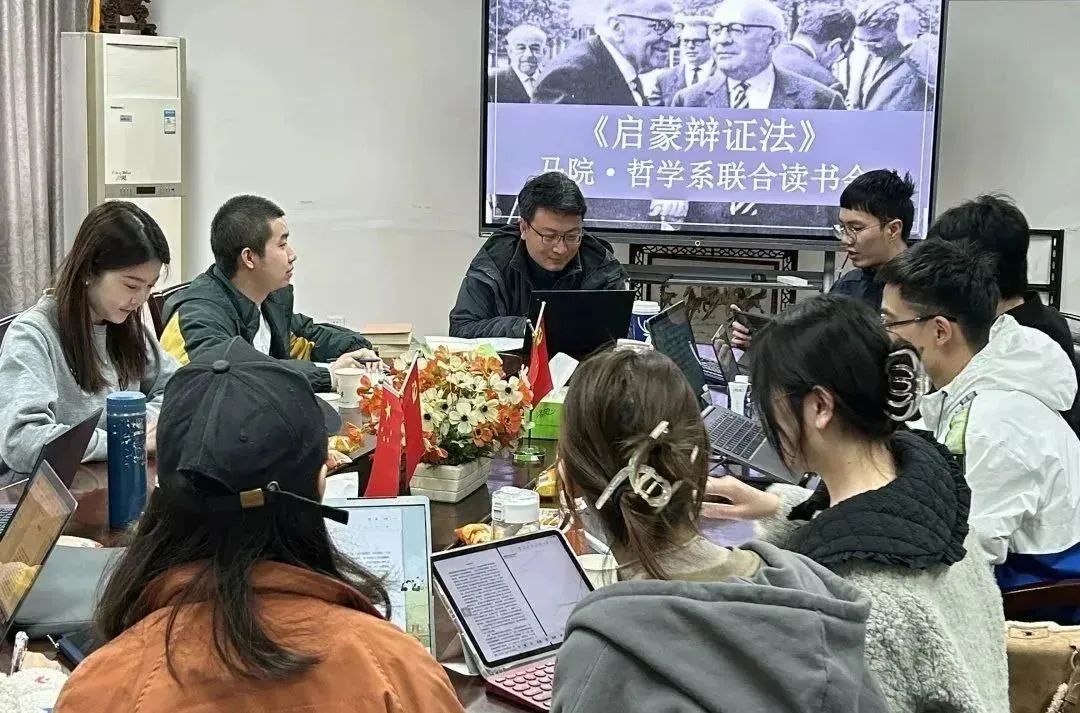On the afternoon of March 26, the Graduate Student Associations of the School of Marxism and the Department of Philosophy at Nanjing University jointly organized a book-club activity, with the theme “Returning to the Concept of Enlightenment” in Classroom 325 at the Department of Philosophy. The book discussed in this activity was Dialectic of Enlightenment, written by Max Horkheimer and Theodor W. Adorno of the Frankfurt School. Li Qiankun, associate professor of the School of Marxism was invited to lead the discussion, and nearly 20 graduate students from School of Marxism, Department of Philosophy, and other departments participated in the activity.

At the beginning, Professor Li introduced why he chose Dialectic of Enlightenment as the study text for this activity. As an inter-disciplinary text with typical significance, this book is not only a philosophical work but also includes contents such as sociology, anthropology, and political and economic criticism. Studying Dialectic of Enlightenment can help the readers open up an interdisciplinary horizon.

Then, Professor Li briefly introduced the textual background of Dialectic of Enlightenment. Although the book was co-authored by Horkheimer and Adorno from 1942 to 1944, a great deal of preparatory work had been done before it was written. In a letter to Leo Lowenthal in May 1942, Horkheimer referred to his writing project as follows: The book may contain five chapters; the first chapter would examine the philosophical concept of Enlightenment and the second would analyze the phenomena of positivism, science, and mass culture, although at that time Horkheimer was still uncertain about the contents of the last three chapters. In addition, Horkheimer also defined the paradigm of critical theory, distinguishing between the traditional theory represented by Descartes and the critical theory represented by Marx.
It should be noted that Professor Li emphasized the Dialectic of Enlightenment cannot be reduced to a mere philosophical critique of mass culture. At that time, Frankfurt School’s investigation into philosophy and mass culture was actually grounded in the examination of economic development across various epochs. By concentrating on Marx’s theory of value and financial crisis, it can be noticed that the philosophical critique of economy advanced by the Frankfurt School itself constituted precisely the foundation for its philosophy and critical theory.

Next, Professor Li gave an overview of the “Concept of Enlightenment” section of the book.The first part, as a declarative judgment, mainly clarifies that Enlightenment reverts to a new kind of myth, and that formal logic and mathematics, as laws of Enlightenment, have become myths themselves in contemporary times; the second part focuses on forms of Enlightenment thought and explores the relationship of Enlightenment to art, philosophy, and faith; the third part discusses Enlightenment and governance, i.e., how Enlightenment has become a myth, and how self-preservation, as the highest principle of reason, is embodied in contemporary society as the subject being eliminated by technology. Moreover, Professor Li delved into the validity of the assertion that “Odysseus, a legendary figure in ancient Greece, is widely considered as the prototype of modern bourgeoisie”, broadening students’ horizons.
In the Q&A session, the participants raised questions about the relation between Lukács’ early theory of art and theories of Horkheimer and Adorno, the metaphor of Odysseus, the relationship between anthropology and historical materialism, and whether Horkheimer’s second Enlightenment exists.Professor Li gave detailed answers one by one, and the students also actively participated in the discussion. The atmosphere was warm and the students gained a lot.
Finally, the participants captured a group photo, marking the successful culmination of the collaborative book-club activity. This event effectively enhanced students’ comprehension of the concept of Enlightenment, facilitating the exploration of new problem domains, and provided an excellent communication platform.


